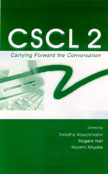CSCL 2Carrying Forward the Conversation (Computers, Cognition, and Work)
|

|
 Diese Seite wurde seit 7 Jahren inhaltlich nicht mehr aktualisiert.
Unter Umständen ist sie nicht mehr aktuell.
Diese Seite wurde seit 7 Jahren inhaltlich nicht mehr aktualisiert.
Unter Umständen ist sie nicht mehr aktuell.
 Zusammenfassungen
Zusammenfassungen
 Carrying Forward the Conversation is a thorough and up-to-date survey of recent developments in Computer Supported Collaborative Learning, one of the fastest growing areas of research in the learning sciences. A follow-up to CSCL: Theory and Practice of an Emerging Paradigm (1996), this volume both documents how the field has grown and fosters a meaningful discussion of how the research program might be advanced in substantive ways.
Recognizing the long-standing traditions of CSCL work in Europe and Japan, the editors sought to broaden and expand the conversation both geographically and topically. The 45 participating authors represent a range of disciplinary backgrounds, including anthropology, communication studies, computer science, education, psychology, and philosophy, and offer international perspectives on the field. For each chapter, the goal was not only to show how it connects to past and future work in CSCL, but also how it contributes to the interests of other research communities. Toward this end, the volume features a "conversational structure" consisting of target chapters, invited commentaries, and author responses. The commentaries on each chapter were solicited from a diverse collection of writers, including prominent scholars in anthropology of education, social studies of science, CSCW, argumentation, activity theory, language and social interaction, ecological psychology, and other areas.
Carrying Forward the Conversation is a thorough and up-to-date survey of recent developments in Computer Supported Collaborative Learning, one of the fastest growing areas of research in the learning sciences. A follow-up to CSCL: Theory and Practice of an Emerging Paradigm (1996), this volume both documents how the field has grown and fosters a meaningful discussion of how the research program might be advanced in substantive ways.
Recognizing the long-standing traditions of CSCL work in Europe and Japan, the editors sought to broaden and expand the conversation both geographically and topically. The 45 participating authors represent a range of disciplinary backgrounds, including anthropology, communication studies, computer science, education, psychology, and philosophy, and offer international perspectives on the field. For each chapter, the goal was not only to show how it connects to past and future work in CSCL, but also how it contributes to the interests of other research communities. Toward this end, the volume features a "conversational structure" consisting of target chapters, invited commentaries, and author responses. The commentaries on each chapter were solicited from a diverse collection of writers, including prominent scholars in anthropology of education, social studies of science, CSCW, argumentation, activity theory, language and social interaction, ecological psychology, and other areas. Kapitel
Kapitel 
- Explaining the lack of dialogue in computer-supported collaborative learning (Mark Guzdial, Karen Carroll)


- Rediscovering CSCL (Seite 169 - 181) (Gerry Stahl)

 Dieses Buch erwähnt ...
Dieses Buch erwähnt ...
 Personen KB IB clear | Carl Bereiter , Karen Carroll , Mark Guzdial , Lissa Holloway-Attaway , Donald A. Norman , Jochen Rick , Jeremy Roschelle , Lew Semjonowitsch Vygotsky , Brandy Walker | ||||||||||||||||||||||||||||||||||||||||||||||||||||||
 Begriffe KB IB clear | CSCLComputer-Supported Collaborative Learning
,  Lernen Lernen learning
, social network analysissocial network analysis learning
, social network analysissocial network analysis
| ||||||||||||||||||||||||||||||||||||||||||||||||||||||
 Bücher |
| ||||||||||||||||||||||||||||||||||||||||||||||||||||||
 Texte |
|
 Dieses Buch erwähnt vermutlich nicht ...
Dieses Buch erwähnt vermutlich nicht ... 
 Nicht erwähnte Begriffe | Bildung, LehrerIn, Schule, Unterricht |
 Zitationsgraph
Zitationsgraph
 Zitationsgraph (Beta-Test mit vis.js)
Zitationsgraph (Beta-Test mit vis.js)
 Zeitleiste
Zeitleiste
 5 Erwähnungen
5 Erwähnungen 
- Computer Support for Collaborative Learning - Foundations for a CSCL Community - Proceedings of CSCL 2002 (Gerry Stahl) (2002)

- Contributions to a Theoretical Framework for CSCL (2002)
- Collaborative Learning at Low Cost - CoWeb Use in English Composition (Jochen Rick, Mark Guzdial, Karen Carroll, Lissa Holloway-Attaway, Brandy Walker)

- What we know about CSCL and implementing it in higher education (Jan-Willem Strijbos, Paul A. Kirschner, Rob L. Martens) (2004)

- Instructional support in CSCL (Sanna Järvelä, Päivi Häkkinen, Maarit Arvaja, Piritta Leinonen)
- Using Learning Protocols for Knowledge Acquisition and Problem Solving with Individual and Group Incentives (Michael Oehl, Hans-Rüdiger Pfister) (2005)


- «Bring Your Own Device (BYOD)» for seamless science inquiry in a primary school (Yanjie Song) (2014)


 Volltext dieses Dokuments
Volltext dieses Dokuments
 | CSCL 2: Gesamtes Buch als Volltext ( : :  , 10062 kByte) , 10062 kByte) |
 | Rediscovering CSCL: Artikel als Volltext ( : :  , 59 kByte) , 59 kByte) |
 | Rediscovering CSCL: Artikel als Volltext ( : :  , 59 kByte) , 59 kByte) |
 |  Explaining the lack of dialogue in computer-supported collaborative learning: Artikel als Volltext ( Explaining the lack of dialogue in computer-supported collaborative learning: Artikel als Volltext ( : :  , 71 kByte; , 71 kByte;  : :  Link unterbrochen? Letzte Überprüfung: 2021-03-21 Letzte erfolgreiche Überprüfung: 2006-07-20) Link unterbrochen? Letzte Überprüfung: 2021-03-21 Letzte erfolgreiche Überprüfung: 2006-07-20) |
 Standorte
Standorte 
 Bibliographisches
Bibliographisches 
| Titel | Format | Bez. | Aufl. | Jahr | ISBN | ||||||
| CSCL 2 | E | Paperback | - | 1 | 2002 | 0805835016 |  |
 |
 |
 |
|
| CSCL 2 | E | Gebunden | - | 1 | 2002 | 0805835008 |  |
 |
 |
 |
 Beat und dieses Buch
Beat und dieses Buch
Beat war Co-Leiter des ICT-Kompetenzzentrums TOP während er dieses Buch ins Biblionetz aufgenommen hat. Die bisher letzte Bearbeitung erfolgte während seiner Zeit am Institut für Medien und Schule. Beat besitzt kein physisches, aber ein digitales Exemplar. (das er aber aus Urheberrechtsgründen nicht einfach weitergeben darf). Es gibt bisher nur wenige Objekte im Biblionetz, die dieses Werk zitieren.

















 Biblionetz-History
Biblionetz-History